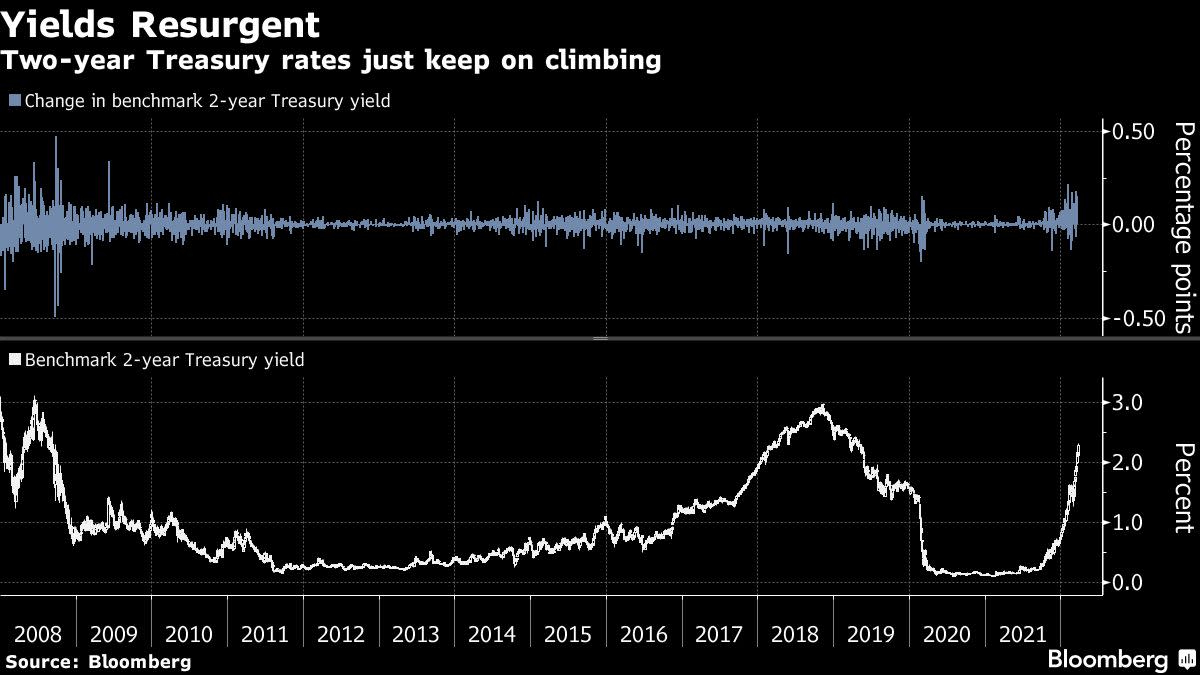
(Bloomberg) — Swaps traders priced in a full two percentage points of additional Federal Reserve interest-rate hikes for 2022 as Treasury yields surged anew on Friday, led by the short end of the curve.
The moves came amid developments in Russia’s invasion of Ukraine and following more hawkish policy predictions by one of Wall Street’s biggest banks. Two-year Treasury yields surged their highest since May 2019, at one stage jumping nearly 19 basis points. While the 30-year rate rose as much as 10 basis points, it was nearly eclipsed by the five-year, which reached 2.57%. Five-year yields last exceeded 30-year yields in 2006.
The swap rate on the December 2022 contract linked to that month’s Fed meeting jumped as much as 17 basis points to 2.44%, more than 200 basis points above the current effective fed funds rate of 0.33%.
The shifts came after economists at Citigroup Inc. predicted that multi-decade high inflation would trigger the Fed to boost its policy rate by a half-point at each of its the next four meetings. While expectations for additional Fed rate increases have been rising steadily for weeks — including a call by Goldman Sachs on March 21 for half-point hikes in May and June — the Citigroup call is among the most aggressive to date.
“The front end of the Treasury curve is getting hammered” by Citigroup’s new Fed call, said Andy Brenner, head of international fixed income at National Alliance.
Investors also are monitoring developments in Russia’s invasion of Ukraine, and the possible economic fallout and inflationary consequences. Friday’s sharp rise in yields coincided with the Russian military saying it’s focusing on taking full control of the Donbas region, a possible sign of reduced ambitions.
Oil temporarily declined Friday as the European Union held off on banning Russian crude imports while reaching agreement with the U.S. to cut reliance on Russian fuel.
The Bloomberg U.S. Treasury index lost 5.65% this year through March 24, on course for its worst quarterly losses since at least 1973, or as far back as Bloomberg tracks data.
“The market will continue to recalibrate expectations to the Fed’s even more hawkish stance,” BMO strategists Ian Lyngen and Ben Jeffery said in a note.
Ten-year inflation expectations, as measured by the gap between nominal Treasury yields and those linked to consumer prices changes, this week reached a new record high above 3%. Consumers’ long-run inflation expectation, as measured by the University of Michigan, remained in check in March at 3%, relative to a one-year inflation expectation of 5.4%.
The Citi analysts warned that the Fed could implement a 75-basis-point hike “if inflation unexpectedly accelerates or long-term inflation expectations rise rapidly,” such as seeing consumers anticipate price gains above 3.5% in the University of Michigan survey.
©2022 Bloomberg L.P.